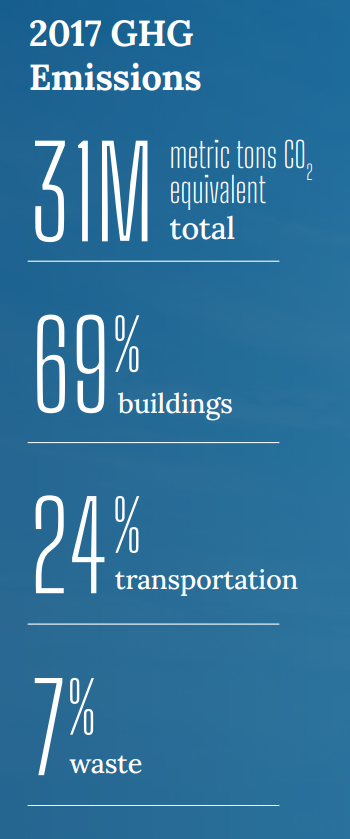Electrify Chicago
An independent tool for viewing City of Chicago building data
According to the
2022 Chicago Climate Action Plan,
69% of Chicago's emissions come from buildings, making
building emissions our biggest challenge and our biggest opportunity as a city
to tackle climate change. At Electrify Chicago, we showcase building performance using
publicly available data supplemented by community-submitted photographs and building
owners.
Start by looking at Chicago's buildings with the highest greenhouse gas intensity i.e. emissions per square foot. Large, efficient, buildings can perform much better than very inefficient small buildings on this metric.
New Article
📰 $30 Million In Missed Fines
The City Of Chicago failed to collect $30 million in potential fines from the building benchmarking ordinance, reducing transparency and accountability.
Legislative update! 🎉
As of late January 2024, legislation is being introduced to require new use more efficient forms of water and space heating, via the Clean And Affordable Buildings Ordinance (CABO), which will reduce the number of highly polluting and inefficient buildings that end up on this site.
If you're in Chicago,
write to your alderman to support the CABO!
Chicago Buildings by Greenhouse Gas Intensity
Note: Data includes large Chicago buildings with data from 2022, unless explicitly stated otherwise.
Note: This data only includes buildings whose emissions are reported
under the
Chicago Energy Benchmarking Ordinance. According to the City “As of 2016,
this list includes all commercial, institutional, and residential buildings larger than
50,000 square feet.” This dataset is also then filtered to only buildings with
reported emissions > 1,000 metric tons CO2 equivalent.
The latest year of data is from 2022, but we update the site regularly when new data is available, and some buildings may have failed to report that year, and only have older data available.
| Property Name / address | Primary Property Type |
Greenhouse Gas Intensity (kg CO2 eq./sqft) |
Total Greenhouse Emissions (metric tons CO2 eq.) |
|---|---|---|---|
|
122 Property LLC
122 S Michigan Ave
| Office | 8.6 kg/sqft
Highest 21%
| 4,383 tons
Highest 8%
|
|
320 N Michigan Ave
320 N Michigan Ave
| Multifamily Housing | 8.5 kg/sqft
Highest 21%
| 806 tons
Lowest 46%
|
|
Hampton Inn Chicago North/Loyola Station
🕰️
1209 W Albion
| Hotel | 8.5 kg/sqft | 780 tons |
|
Depaul University Holtschneider Performance Center
(DePaul)
2330 N HALSTED ST
| Performing Arts | 8.5 kg/sqft
Highest 21%
| 1,576 tons
Highest 30%
|
|
Pulaski Promenade
4150 S PULASKI RD
| Lifestyle Center | 8.5 kg/sqft
Highest 21%
| 1,042 tons
Highest 44%
|
|
Nathan S Davis -CPS
(CPS)
3014 W 39th Place
| K-12 School | 8.5 kg/sqft
Highest 21%
| 1,034 tons
Highest 44%
|
|
Doolittle Elementary / Chi Arts -CPS
🕰️
(CPS)
521 E 35th St
| K-12 School | 8.5 kg/sqft | 954 tons |
|
Dulles -CPS
(CPS)
6311 S Calumet Ave
| K-12 School | 8.5 kg/sqft
Highest 21%
| 604 tons
Lowest 34%
|
|
Ruiz Elementary - CPS
(CPS)
2410 S Leavitt St
| K-12 School | 8.5 kg/sqft
Highest 21%
| 678 tons
Lowest 39%
|
|
Brooks College Prep. Acad - CPS
(CPS)
250 E 111th St
| K-12 School | 8.5 kg/sqft
Highest 21%
| 2,237 tons
Highest 20%
|
|
Gage Park
🕰️
2411 W 55th St
| Other - Recreation | 8.5 kg/sqft | 502 tons |
|
1940 1960 W HOOD AVE
1940 1960 W HOOD AVE
| Multifamily Housing | 8.5 kg/sqft
Highest 21%
| 622 tons
Lowest 35%
|
|
Bell Federal Building
79 W Monroe St
| Office | 8.5 kg/sqft
Highest 21%
| 1,683 tons
Highest 28%
|
|
Latin School of Chicago Lower School
🕰️
1529 N. Dearborn Pkwy
| K-12 School | 8.5 kg/sqft | 601 tons |
|
50 E Chestnut St
50 E Chestnut St
| Multifamily Housing | 8.5 kg/sqft
Highest 21%
| 1,172 tons
Highest 40%
|
Data Source:
Chicago Energy Benchmarking Data
